
C# Numeric Types
1 - C# Numeric Types
C# has the predefined numeric types.
There are three types of predefined numeric types:
- signed Integral
- unsigned Integral
- real number, number with decimal parts
01. C# Integral-signed
Predefined Integral-signed numeric types in C#:
| C# type | System type | Suffix | Size | Range |
|---|---|---|---|---|
sbyte | SByte | No Suffix | 8 bits | -2^7 to 2^7 -1 |
short | Int16 | No Suffix | 16 bits | -2^15 to 2^15-1 |
int | Int32 | No Suffix | 32 bits | -2^31 to 2^31-1 |
long | Int64 | L | 64 bits | -2^63 to 2^63-1 |
02. C# Integral-unsigned
Predefined Integral-unsigned numeric types in C#:
| C# type | System type | Suffix | Size | Range |
|---|---|---|---|---|
byte | Byte | No Suffix | 8 bits | 0 to 2^8 -1 |
ushort | UInt16 | No Suffix | 16 bits | 0 to 2^16-1 |
uint | UInt32 | U | 32 bits | 0 to 2^32-1 |
ulong | UInt64 | UL | 64 bits | 0 to 2^64-1 |
03. C# Real
Predefined real numeric types in C#:
| C# type | System type | Suffix | Size | Range |
float | Single | F | 32 bits | +/- (~10^-45 to 10^38) |
double | Double | D | 64 bits | +/- (~10^-324 to 10^308) |
decimal | Decimal | M | 128 bits | +/- (~10^-28 to 10^28) |
The decimal type is typically used for financial calculations.
2 - C# Numeric Literals
Integral literals can use decimal or hexadecimal notation.
Hexadecimal is denoted with the 0x prefix.
For example:
int x = 17;
long y = 0x8F;Real literals can use decimal and/or exponential notation.
For example:
double d = 1.5;
double million = 1E06;*** You can insert an underscore anywhere inside a numeric literal to make it more readable:
int million = 1_000_000;*** You can specify numbers in binary with the 0b prefix:
var b = 0b1010_1001_1110_1101_1010_1101;Example:
using System;
using System.Collections.Generic;
using System.Linq;
using System.Text;
using System.Threading.Tasks;
namespace HelloWorld
{
class Program
{
static void Main(string[] args)
{
int x = 127;
long y = 0x7F;
Console.WriteLine(x);
Console.WriteLine(y);
double d = 1.5;
double million = 1E06;
Console.WriteLine(d);
Console.WriteLine(million);
Console.ReadLine();
}
}
}
Output:
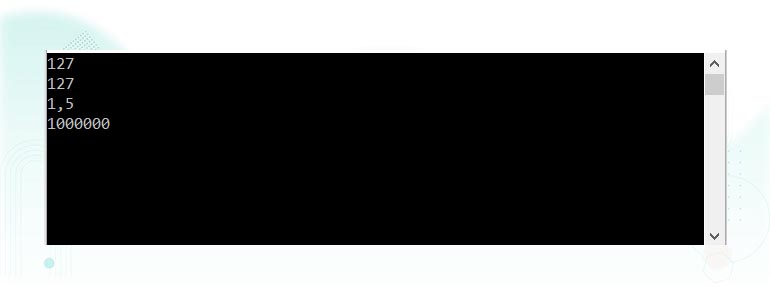
3 - C# Numeric literal type inference
C# compiler infers a numeric literal to be either double or an integral type:
- If the literal contains a decimal point or the exponential symbol (E), it is a double.
- Then it check if the value can be fit in an type in the following list:
int,uint,long, andulong.
For example:
- 1.0 will be
doubleby default since it has decimal part. - 4 is a
inttype.
The following code outputs the inferred type for each literal:
using System;
using System.Collections.Generic;
using System.Linq;
using System.Text;
using System.Threading.Tasks;
namespace HelloWorld
{
class Program
{
static void Main(string[] args)
{
Console.WriteLine(1.0.GetType()); // (double)
Console.WriteLine(1E06.GetType()); // Double (double)
Console.WriteLine(1.GetType()); // Int32 (int)
Console.WriteLine(0xF0000000.GetType()); // UInt32 (uint)
Console.WriteLine(0x100000000.GetType()); // Int64 (long)
Console.ReadLine();
}
}
}
Output:
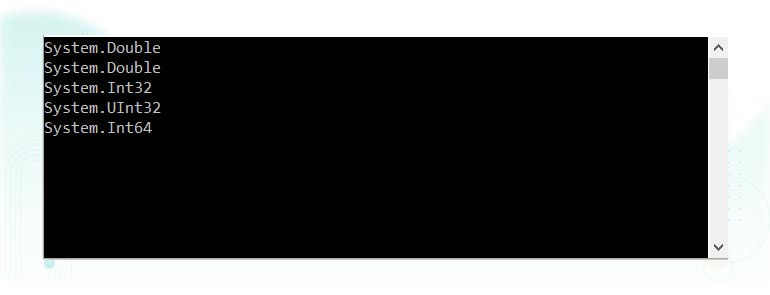
4 - C# Numeric suffixes
Numeric suffixes explicitly define the type of a literal.
You can set a literal type by using suffix.
By default 1.0 is inferred as double by C# compiler, if you want to make it float type, you can add F as suffix.
Suffixes can be either lower or uppercase. and are as follows:
| Category | C# type | Example |
|---|---|---|
F | float | float f = 1.0F; |
D | double | double d = 1D; |
M | decimal | decimal d = 1.0M; |
U | uint | uint i = 1U; |
L | long | long i = 1L; |
UL | ulong | ulong i = 1UL; |
F and M suffixes are the most useful and should always be applied when specifying float or decimal literals.
Without the F suffix, the following line would not compile, because 4.5 would be inferred to be of type double, which has no implicit conversion to float:
float f = 4.5F; The same principle is applied for a decimal literal:
decimal d = -1231.13M; // Will not compile without the M suffix.Example:
using System;
using System.Collections.Generic;
using System.Linq;
using System.Text;
using System.Threading.Tasks;
namespace HelloWorld
{
class Program
{
static void Main(string[] args)
{
Console.WriteLine(1.0.GetType()); // (double)
Console.WriteLine(1E06.GetType()); // Double (double)
Console.WriteLine(1.GetType()); // Int32 (int)
Console.WriteLine(0xF0000000.GetType()); // UInt32 (uint)
Console.WriteLine(0x100000000.GetType()); // Int64 (long)
Console.WriteLine(1.0F.GetType());
Console.WriteLine(1E06F.GetType());
Console.WriteLine(1U.GetType());
Console.ReadLine();
}
}
}Output:
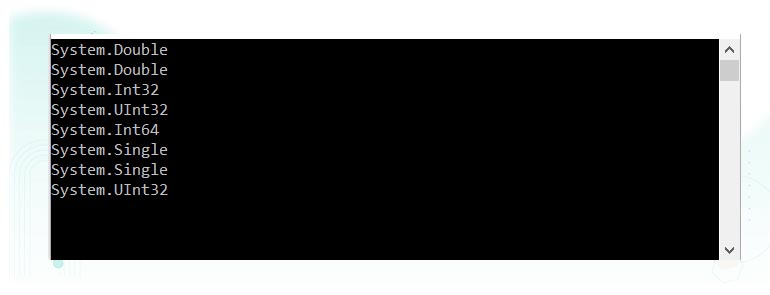
5 - C# Numeric Conversions
01. C# Integral to integral conversions
Converting between integral types:
Integral type conversions are implicit if the destination type can represent every possible value of the source type.
Otherwise, an explicit conversion is required.
For example:
int x = 1; // int is a 32-bit integer
long y = x; // Implicit conversion to 64-bit integral type
short z = (short)x; // Explicit conversion to 16-bit integral type02. C# Floating-point to floating-point conversions
A double can represent every possible value of a float.
A float point value can be implicitly converted to a double.
Assign double type to float type must be explicit.
03. C# Floating-point to integral conversions
All integral types may be implicitly converted to all floating-point types:
int i = 5;
float f = i;The reverse conversion must be explicit:
int i2 = (int)f;*** When you cast from a floating-point number to an integral, any fractional portion is truncated(lost).
Note:
- During casting from a floating-point number to an integral type, fractional portion is truncated and no rounding is performed.
System.Converthas methods to round floating point values while converting between various numeric types.- Implicitly converting a integral type to a floating-point type preserves magnitude but may occasionally lose precision.
Example:
using System;
using System.Collections.Generic;
using System.Linq;
using System.Text;
using System.Threading.Tasks;
namespace HelloWorld
{
class Program
{
static void Main(string[] args)
{
int i1 = 100000001;
float f = i1; // Magnitude preserved, precision lost
int i2 = (int)f;
Console.WriteLine(i1);
Console.WriteLine(f);
Console.WriteLine(i2);
Console.ReadLine();
}
}
}
Output:
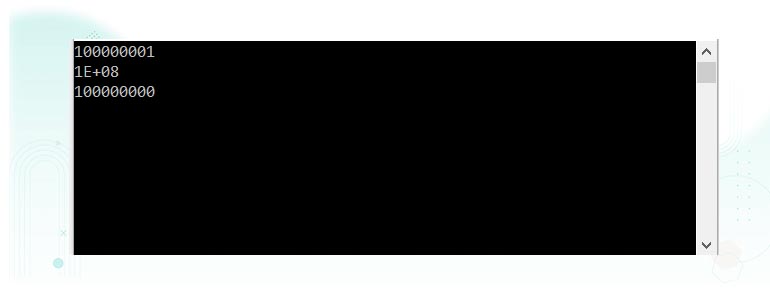
6 - C# Decimal conversions
A decimal value can represent every possible integral-type value in C#.
All integral types can be implicitly converted to the decimal type.
All other numeric conversions to and from a decimal type must be explicit.
7 - C# Type Conversion Methods
C# provides the following built-in type conversion methods:
- ToBoolean: Converts a type to a Boolean value, where possible.
- ToByte: Converts a type to a byte.
- ToChar: Converts a type to a single Unicode character, where possible.
- ToDateTime:Converts a type (integer or string type) to date-time structures.
- ToDecimal: Converts a floating point or integer type to a decimal type.
- ToDouble: Converts a type to a double type.
- ToInt16: Converts a type to a 16-bit integer.
- ToInt32: Converts a type to a 32-bit integer.
- ToInt64: Converts a type to a 64-bit integer.
- ToSbyte: Converts a type to a signed byte type.
- ToSingle: Converts a type to a small floating point number.
- ToString: Converts a type to a string.
- ToType: Converts a type to a specified type.
- ToUInt16: Converts a type to an unsigned int type.
- ToUInt32: Converts a type to an unsigned long type.
- ToUInt64: Converts a type to an unsigned big integer.
The following example converts various value types to string type:
using System;
using System.Collections.Generic;
using System.Linq;
using System.Text;
using System.Threading.Tasks;
namespace HelloWorld
{
class Program
{
static void Main(string[] args)
{
int i = 75;
float f = 53.005f;
double d = 2345.7652;
bool b = true;
Console.WriteLine(i.ToString());
Console.WriteLine(f.ToString());
Console.WriteLine(d.ToString());
Console.WriteLine(b.ToString());
Console.ReadLine();
}
}
}Output:
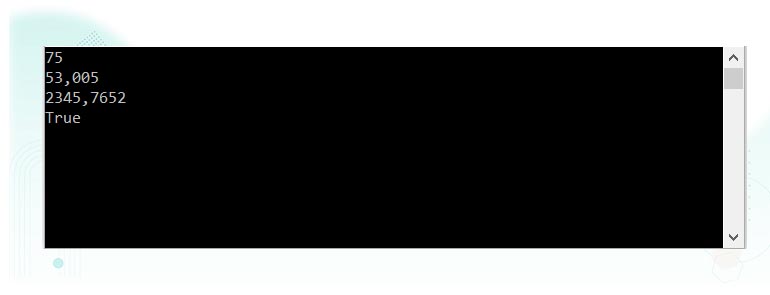
Related Tutorials:
- C# Data Types
- C# Variables
- C# Types of Variables
- C# Integer Variable Types
- C# Floating Point Variables
- C# Boolean Variable Type
- C# Character Variable Type
- C# String Variables
- C# Casting Variable Types
- C# Implicitly Typed Local Variable: C# Var keyword
- C# Keywords
- C# Comments
- C# Parameters
- C# Constants
- C# Value and Reference Types
- C# Numeric Value
- C# User Input